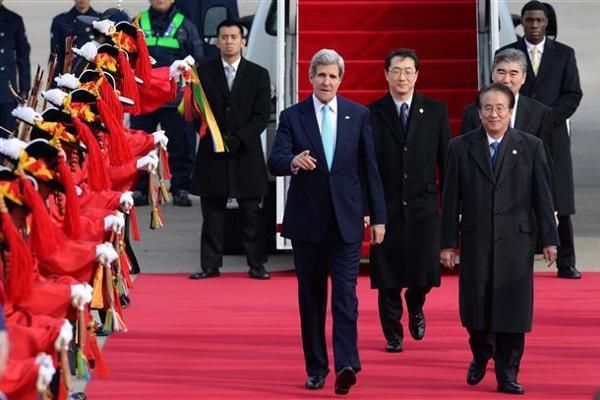Kerry in Seoul after rare North-South Korea talks
SEOUL - Agence France-Presse


U.S. Secretary of State John Kerry (L) walks with South Korean Deputy Foreign Minister Lee Kyung-soo (R) upon his arrival at a military airport in Seongnam, south of Seoul February 13, 2014. REUTERS Photo
US Secretary of State John Kerry arrived in Seoul Thursday for discussions on North Korea's nuclear programme, a day after high-level inter-Korean talks failed to resolve a row over looming South Korea-US military drills.South Korea was Kerry's first stop on an Asia tour that will also take him to China and Indonesia, with a focus on regional tensions stoked by China's territorial claims.
As well as discussing efforts to rein in Pyongyang's nuclear weapons programme, Kerry will be briefed in Seoul on a diplomatic initiative that saw the two Koreas sit down Wednesday for their highest-level official talks since 2007.
The discussions ran late into the night, and ended without any tangible agreement or joint statement.
But the South's Unification Ministry said a second round would be held Friday in the border truce village of Panmunjom where the armistice ending the 1950-53 Korean War was signed 60 years ago.
Although the talks have no fixed agenda, the South is focused on ensuring that a planned reunion later this month for family members separated by the 1950-53 Korean War goes ahead as scheduled.
The February 20-25 event overlaps with the start of South Korea's annual joint military exercises with the United States, which Pyongyang has denounced as provocative.
On Wednesday, the North side demanded the joint drills be postponed until after the reunion was over, but the South's Unification Minister Ryoo Kihl-Jae said the request had been turned down.
"The government made it clear this is unacceptable," Ryoo told parliament.
There was no immediate comment from North Korea.
Briefing reporters in Seoul, presidential spokesman Min Kyung-Wook indicated that the talks were a good opportunity for the two rivals to sound each other out.
"We've become clearly aware of North Korea's intentions, and this was also an opportunity for us to clearly explain our principles," he quoted a government official as saying.
There was only a token discussion of North Korea's nuclear programme, which will be the main focus of Kerry's visit.
North Korea and its main ally China want a resumption of six-party talks on the North's nuclear ambitions, but Washington and Seoul both insist that Pyongyang must first demonstrate some tangible commitment to abandoning nuclear weapons.
In Beijing, Kerry will encourage China to "use its unique set of ties and leverage" to pressure Pyongyang to prove it is serious about wanting to restart the six-party process, a State Department official said.
Kerry believes "the North Korean nuclear threat is not a problem that we can all admire from a distance," the official added.
Kerry's visit comes ahead of an Asia tour in April by President Barack Obama, which will take in Japan and South Korea.
The US has also repeatedly called for the isolated North to release Kenneth Bae, a Korean-American missionary who was sentenced to 15 years' hard labour last year on sedition charges.
The State Department on Tuesday again voiced frustration that an invitation to US envoy Robert King to discuss Bae's case was extended on February 5 but withdrawn just three days later.
US officials called on North Korea to show "compassion" for the 45-year-old, who is forced to work 10 to 12 hours a day even though his health is failing.
During his brief stay in Seoul, Kerry will meet President Park Geun-Hye, who came to office a year ago on a campaign promise of greater engagement with Pyongyang.
Wednesday's talks, which were held at Pyongyang's instigation, had raised hopes that the two sides might be ready to embark on a genuine trust-building dialogue.
But South Korea remains wary of the impoverished North's intentions, suggesting that Pyongyang's only real desire is to see the resumption of several lucrative cross-border projects.
Paik Hak-Soon, an analyst at the Sejong Institute in Seoul, stressed there was still room for optimism.
"At least these senior officials met for the first time in a very long time," Paik said.
"You can't expect them to produce a major decision at the first meeting. They go back to the capitals, talk with their leaders and will likely meet again after the South-US army drill is over," he added.
